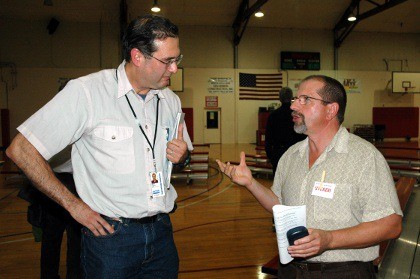MARYSVILLE – “If you want to visit a house where there is a sustained odor, I have it down to a schedule when we smell it, and you are more than welcome to come to my house,” Marysville resident Suavek Lobrow said at the Marysville Boys & Girls Club Sept. 9.
“I’m not going to sit on your front doorstep and wait for the smell,” said Mario Pedroza, supervising inspector for the Puget Sound Clean Air Agency.
“You wouldn’t be sitting outside, because I’d invite you in for tea or coffee,” Lobrow said, drawing laughter from Pedroza and the rest of the attendees of that evening’s meeting of the “Citizens for a Smell Free Marysville” group.
Lobrow was not the only area resident to invite Pedroza and his inspectors to camp out at their house, after Pedroza told the crowd that, out of 457 recorded complaints and more than 100 investigation visits for odor in Marysville and Everett from June 29 to Sept. 1, Clean Air inspectors were not able to document any violations against the alleged source of the smell, Cedar Grove Composting on Smith Island in Everett.
“We conducted enhanced patrols in late July and August,” Pedroza said. “We responded to some complaints within 10 minutes. None of them took us longer than 30 to 40 minutes to respond to, unless it was when there was just no one around to respond. What we always heard was, ‘I wish you’d been here five or 10 minutes ago.'”
Although Citizens for a Smell Free Marysville also gave Marysville Mayor Jon Nehring and pulmonary disease specialist Dr. David Russian opportunities to address the crowd and respond to their concerns, Pedroza wound up receiving the majority of their questions and expressions of frustration during the group’s second meeting, even before Nehring’s time at the podium had officially wrapped up.
Pedroza emphasized that he believed the residents’ reports of recurring odors at their homes, but explained that regulations governed by state law and the burdens of prosecuting such cases in court require that his inspectors be present at people’s homes or places of work when such smells are there in order to corroborate the citizens’ claims.
“There have been cases where we’ve actually driven through the odor, as we’ve gone from one house to the next where it’s been reported, and each time, it’s shifted away from those houses by the time we’ve gotten there,” Pedroza said. “It doesn’t mean it wasn’t there, just that we can’t document it as a violation.”
Pedroza elaborated that such complaints can only be made by people who live or work in the places where they smell such odors, because anywhere else is considered an area that people have the option to leave. City of Marysville Chief Administrative Officer and Community Development Director Gloria Hirashima acknowledged that this raises questions about who has grounds to report such smells at public parks owned by the city and funded by taxpayers.
Pedroza added that the only measuring device available to Clean Air inspectors is their own noses, which he admitted makes such cases difficult to prove.
Nehring praised the group’s members for taking time out of their schedules to run what he deemed a grass-roots movement. He assured the meeting’s attendees that the city has placed “the highest priority” on solving the problem of the smell, citing City Council member Jeff Vaughan’s tour of the local Cedar Grove facility and his own meetings with city of Everett officials about the issue.
“One of my first meetings in office was with Everett Mayor Ray Stephanson, who proactively stated that he’s committed to finding a solution as well,” Nehring said. “We live here too, so we smell it also.”
Mike Davis, who founded Citizens for a Smell Free Marysville, thanked the Clean Air inspectors and the Marysville city officials for their responsiveness, as well as state Rep. Hans Dunshee, all of whom he’s meet with regularly to discuss the next steps that can be taken.
Russian’s presentation covered how the organic chemicals and bioaerosols released into the air by composting plants can cause conditions such as asthma sensitization, which can lead to symptoms and lung damage even when exposure to the elements that cause them are reduced or eliminated entirely.
“The quantity of elements in the air is not relevant to the degree of damage it can do to your lungs,” Russian said. “Even if you can’t smell it, it can still cause damage.”
When his audience asked if he could present this information to policy makers, Russian noted that he planned to meet with Paul Roberts, Board chair of the Puget Sound Clean Air Agency and president of the Everett City Council, and is “happy to give this presentation anywhere.”
Davis followed Russian by citing a fully enclosed composting facility that’s been built in Rancho Cucamonga, Calif., as an example that Cedar Grove could adopt to eliminate odor. He then concluded the meeting with calls for volunteers to deliver petitions to elected officials, contact area news media and local businesses, and meet with the Clean Air Board and the Department of Ecology.
The Citizens for a Smell Free Marysville website is http://freemarysville.blogspot.com, and the Puget Sound Clean Air Agency complaint website is www.pscleanair.org/contact/complaint.aspx.
To report an odor by phone, call the agency at either 206-343-8800, ext. 6, or 800-552-3565, ext. 6. You can also report it via e-mail at inspection@pscleanair.org.



